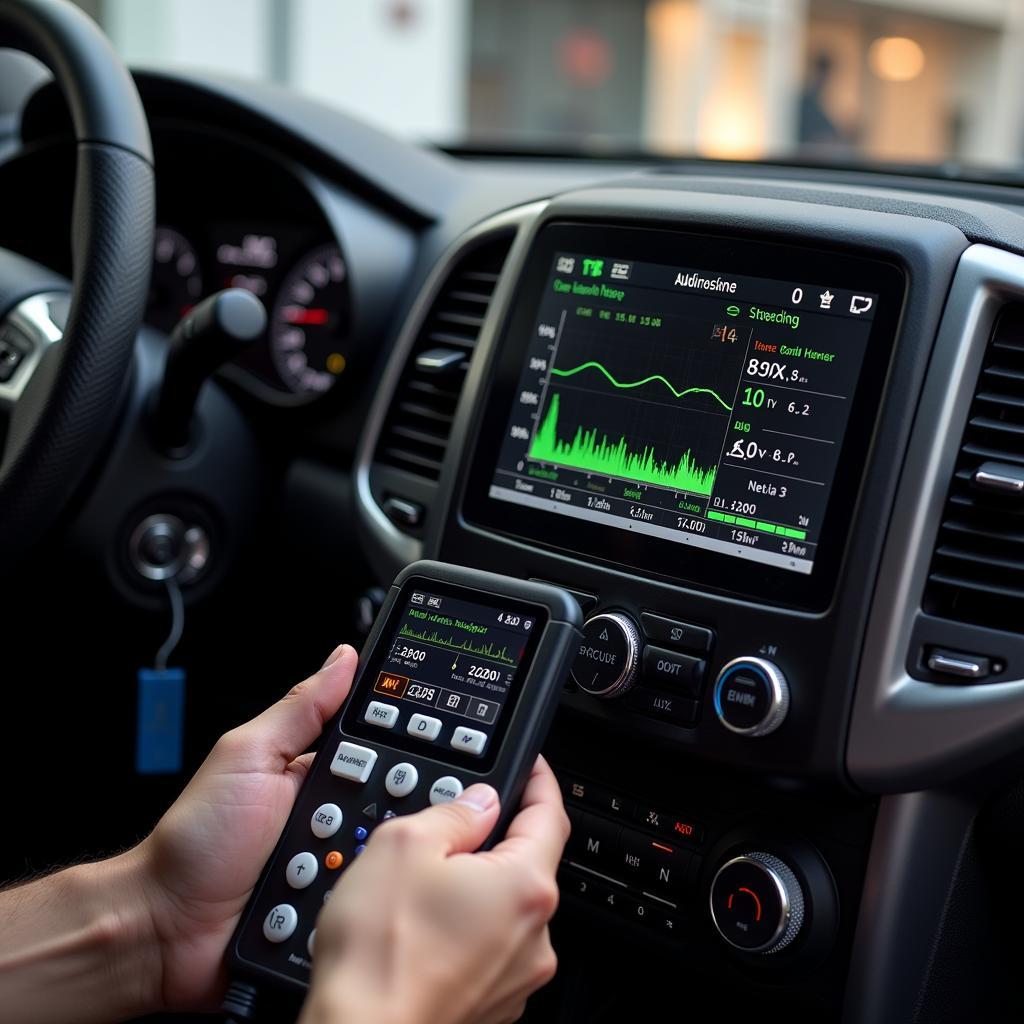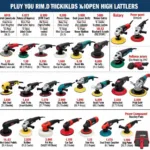Car audio distortion tools are essential for achieving a pristine listening experience in your vehicle. Whether you’re a seasoned audiophile or a casual listener, identifying and eliminating distortion can dramatically improve your sound quality. This article will delve into the world of car audio distortion tools, exploring their various types, functionalities, and how to effectively utilize them for optimal audio performance. We’ll also discuss the common causes of distortion and how these tools can pinpoint the source of the problem.
Understanding Car Audio Distortion
Distortion is any unwanted alteration to the original audio signal, manifesting as crackling, buzzing, hissing, or a muddy sound. Several factors can contribute to distortion, including faulty wiring, improperly matched components, or a damaged speaker. Identifying the root cause is the first step towards resolving the issue.
Types of Car Audio Distortion Tools
Various tools can help diagnose and fix car audio distortion. Understanding their functions is crucial for selecting the right tool for your needs. Some of the most common tools include oscilloscopes, multimeters, and specialized car audio analyzers. Each tool offers unique capabilities for diagnosing different types of distortion.
Oscilloscopes: Visualizing the Audio Signal
Oscilloscopes provide a visual representation of the audio signal, allowing you to see the waveform and identify anomalies that indicate distortion. This can be particularly helpful for identifying clipping, a common form of distortion caused by overdriving the amplifier.
Multimeters: Measuring Voltage and Resistance
Multimeters are essential for checking the integrity of wiring and components. They can measure voltage and resistance, helping identify faulty connections or damaged speakers. A multimeter can also be used to verify the proper grounding of the audio system, a critical factor in preventing distortion.
Specialized Car Audio Analyzers: Comprehensive Diagnostics
Specialized car audio analyzers offer a comprehensive suite of diagnostic capabilities. They can measure distortion levels, frequency response, and other critical parameters. Some analyzers even include built-in signal generators, allowing you to test the entire audio system with precision.
Using Car Audio Distortion Tools Effectively
Using these tools effectively requires a basic understanding of audio principles and the specific functions of each tool. If you’re new to car audio diagnostics, consulting a professional or referring to online resources can be invaluable. There are a variety of car audio analysis tools available, ranging from simple handheld devices to sophisticated computer-based systems.
Common Causes of Car Audio Distortion and Their Solutions
Understanding the common causes of car audio distortion is crucial for effective troubleshooting. Here are some common culprits:
-
Clipping: This occurs when the amplifier is pushed beyond its limits, resulting in a harsh, distorted sound. Use an oscilloscope or a car audio clipping tool to identify clipping. The solution is to reduce the gain on the amplifier or replace it with a more powerful unit.
-
Ground Loops: These occur when there are multiple grounding points in the audio system, creating a path for unwanted electrical noise. A multimeter can be used to identify ground loops. The solution is to ensure all components are grounded to a single point.
-
Faulty Wiring: Damaged or poorly connected wires can introduce noise and distortion. Use a multimeter to check the continuity of the wiring. Replace any damaged or corroded wires.
“A proper diagnosis is the foundation of any successful car audio repair,” says renowned car audio expert, Michael Johnson, CEO of Audio Solutions Inc. “Using the right tools can save you time and frustration in the long run.”
Tuning for Optimal Performance
Once you’ve identified and resolved the source of distortion, you can then focus on tuning the system for optimal performance. This involves adjusting the equalizer, crossover settings, and other parameters to achieve the desired sound. Tools like car audio tuning tools can greatly assist in this process. They provide precise control over various audio parameters, allowing you to fine-tune the system to perfection.
“Fine-tuning your system with the right tools can transform a good sound system into a great one,” adds Johnson. “It’s about maximizing the potential of your equipment and tailoring the sound to your personal preferences.”
Conclusion
Car audio distortion tools are indispensable for achieving a clean and enjoyable listening experience. By understanding their functions and applying them effectively, you can diagnose and resolve distortion issues, paving the way for a superior audio experience. Using car audio distortion tools effectively, coupled with a thorough understanding of the causes of distortion, is key to achieving high-fidelity sound in your car. Investing in quality car audio amplifier setup tool can significantly improve the overall sound quality. Remember, a little knowledge and the right tools can make all the difference in transforming your car into a mobile concert hall.
FAQs
- What are the most common types of car audio distortion?
- How can I tell if my car speakers are blown?
- What is the purpose of a car audio oscilloscope?
- Can I fix car audio distortion myself?
- What are some good resources for learning more about car audio repair?
For further assistance, we also have articles on steel tool box best car speakers.
Need help with your car audio diagnostics? Contact us via WhatsApp: +1(641)206-8880, Email: [email protected] or visit us at 910 Cedar Lane, Chicago, IL 60605, USA. Our 24/7 customer service team is always ready to assist you.


